Addressing Health Inequities and Enhancing Population Health Management Strategies Through GeoAnalytics
The link between communities, places, and health is well established in the scientific and public health literature, and differences in the characteristics of places can help explain differences in health inequalities. Place-based analysis, as illustrated in this project, offers a lens to better understand the health needs of local communities, evaluate gaps in health service accessibility, and show where opportunities to intervene exist.
The Ontario health system has become more locally oriented with the introduction of Ontario Health Teams, providing a vital link between health policy makers, health service providers, and local communities. OHTs are sources of expertise in data collection, analysis, and evidence-based approaches to improve population health and health equity. As such, there is tremendous potential for these organizations to conduct analyses that are relevant and impactful for local health services and health outcomes.
This project reviewed the potential role of geoanalytics for Ontario Health Teams via an examination of place-based analytic approaches at the local level, examination of use-case scenarios for emergency department visits and mammography screening, and an evaluation of the potential for geoanalytics within a population health framework.
Importantly, we are concerned here with how the analytic results can be used in health system planning and point-of-care, with the goal of improving the health of local populations. For this project, use-cases have been selected to make use of existing data available to Southlake Community OHT and for those that can lead to impactful interventions and upstream engagement strategies in the short-term.
The final evaluation further discusses the potential for spread and scale of the analytic frameworks, data systems, and tools at the Provincial level. Looking towards future digital infrastructure, a geoanalytics approach has strong potential to integrate with existing health data systems and provide a much-needed link between often-inaccessible health administrative data and locally relevant population statistics.
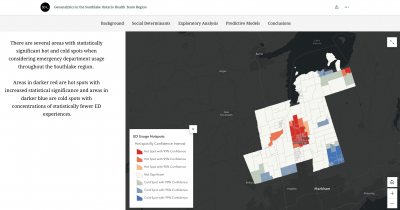 ArcGIS StoryMap
ArcGIS StoryMap
Geoanalytics in the Southlake Ontario Health Team Region – this StoryMap presents the geoanalytic results for the emergency department and mammography screening use-case scenarios. This StoryMap was created as part of the Rural R:ISK project funded by the Social Sciences and Humanities Research Councile (SSHRC).
Health geoanalytics can support public health organizations such as OHTs in making informed decisions, optimizing resource allocation, and improving the efficiency of their operations. This may lead to cost savings by reducing waste, targeting interventions effectively, and improving overall health outcomes in the population.
Infographics of Health Indicators for Southlake Community OHT
| Emergency Department Visits | Hospitalization | Homecare |
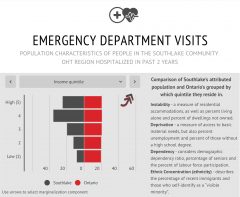 Interactive Infogram Interactive Infogram |
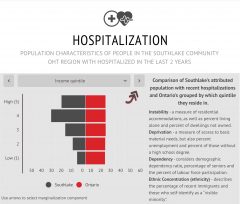 Interactive Infogram Interactive Infogram |
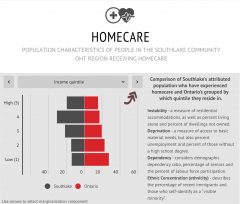 Interactive Infogram Interactive Infogram |
| Mental Health Diagnosis | Frailty | |
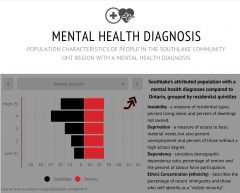 Interactive Infogram Interactive Infogram |
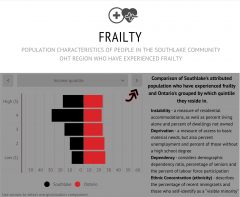 Interactive Infogram Interactive Infogram |
Steering Committee Members
This project was guided with the expert input from a steering committee and contributing stakeholders.
| Geo-Analytics Steering Committee Membership | ||||
| First Name | Last Name | Organization | Role | |
| Anna | Malenkov | York Region | Program Manager Data Services | |
| David | Seymour | York Region | Statistical Data Analyst | |
| Farzin | Bahadori | Southlake Community OHT | OHT Digital Health Lead | |
| Gayle | Seddon | Southlake Community OHT | Director, OHT | |
| Paul | Cantarutti | Southlake Academic Family Health Team | Family Physician | |
| Dane | Clarke | CBI Health | Assistant Vice President, Partnership | |
| Julia | Brown | Southlake Regional Health Centre | Manager – Cancer Prevention & Screening | |
| Julia | Gao | Ontario Health | Group Manager, Analytics (Cancer Care) | |
| Sukumar | Gugananthan | Southlake Regional Health Centre | Manager, Enterprise Analytics | |
| David | Pan | Southlake Community OHT | GIS Analyst | |
| Contributing Stakeholders | ||||
| Stella | Johnson | Southlake Regional Health Centre | Director, Emergency & Mental Health, Emergency | |
| Ellaine | Ma | Southlake Regional Health Centre | Consultant, SRH Decision Support | |
| Rishma | Pradhan | East Toronto Health Partners | Manager, OHT development and Care Integration | |
| Jeff | Powis | East Toronto Health Partners | Medical Lead, Integrated Care | |
| Catherine | Yu | East Toronto Health Partners | EasT-FPN Primary Care Lead and Family Physician | |
| Consulted Stakeholder Committees | ||||
| Joint Executive Steering Committee | Southlake Community Ontario Health Team | |||
| Operational Leadership Table | Southlake Community Ontario Health Team | |||
| Community Support Services | Southlake Community Ontario Health Team | |||
| East Toronto GeoAnalytics Study | East Toronto Health Partners | |||